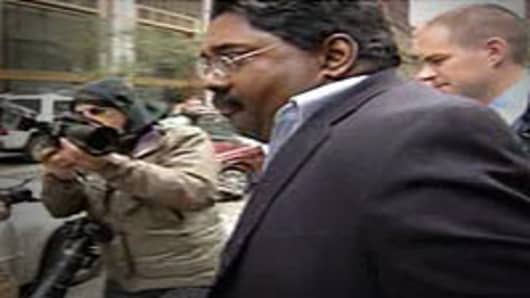After one week of testimony in the insider trading trial of Galleon Group co-founder Raj Rajaratnam, one thing is clearer than ever: In the brutally competitive world of hedge funds, information is everything. A jury will ultimately decide whether the information Rajaratnam got—and made millions trading with—was illegal inside information. But there is no disputing that he went to great lengths to get it.
That is because prosecutors have Rajaratnam on tape in dozens of wiretapped phone conversations—an element that sets this case apart from past insider trading trials.
The government says the tapes are irrefutable proof of insider trading. The defense says they simply show a diligent hedge fund manager doing what he does best: gathering as much public information as he can to make informed investment decisions.
Rajaratnam's specialty was technology—especially microprocessors. So he became close with his former Wharton classmate Anil Kumar, a senior partner at the giant consulting firm McKinsey & Co., who spent nearly three days this week testifying for the prosecution under a plea agreement.
Kumar has admitted to conspiracy and securities fraud, and claims Rajaratnam paid him more than $2 million for illegal tips. The defense says any payments to Kumar were for legitimate consulting work.
One of Kumar's most important clients was chip maker Advanced Micro Devices, where he testified he was part of the company's inner circle. Kumar and Rajaratnam are heard on tape discussing key events at AMD, including the 2006 acquisition of graphic chip maker ATI, and a 2008 investment by the Abu Dhabi investment firm Mubadala that allowed AMD to spin off its manufacturing operations. The latter deal was not announced until October 7, 2008, but Rajaratnam and Kumar are heard discussing the deal on August 15, 2008, when Kumar called Rajaratnam's wiretapped cellphone:
Kumar: "So yesterday they agreed on, at least they've shaken hands and said they're going ahead with the deal."
Rajaratnam: "Uh huh."
Kumar: "Um, so I think you can now just buy..."
Rajartnam expresses concern that AMD's earnings that quarter will blunt any impact from the deal, but Kumar tells him not to worry:
Kumar: "...there will be such a boost from this announcement, it will be fine."
Rajaratnam: "Right, what's the, what's the deal? How much are they investing?"
Kumar: "Uh, they'll probably put up to six to eight billion."
The investment was ultimately trimmed to around $5 billion by the time the deal was announced at the depths of the financial crisis, but the deal still provided a big boost to AMD's stock.
The day before the announcement, Rajaratnam is heard telling one of his portfolio managers, David Lau, that his long position in AMD was a saving grace in a very tough month:
"The stock is at $4. The Arabs, uh, Mubadala...is gonna put five billion dollars into them, and split the company in two."
The defense claims Rajaratnam was holding the stock because of public information about a possible deal, not because of any tips by Kumar.
Rajaratnam had plenty of other friends in high places, including former Goldman Sachs and Procter & Gamble board member Rajat Gupta, accused by the Securities and Exchange Commission of providing inside tips to Rajaratnam, which Gupta denies.
In July, 2008, Gupta and Rajaratnam are heard talking about Goldman Sachs' board discussing ways to diversify the firms asset base—a discussion that was supposed to be confidential:
Gupta: "If Wachovia was a good deal and they, you know, it's quite conceivable they'd come and say let's go buy Wachovia."
Rajaratnam: "Or even AIG, right?"
Gupta: "Or even AIG. Yeah."
Rajaratnam: "Uh hum."
Gupta: "AIG, it was definitely on—in the discussion."
Information flows in many ways on Wall Street, and Rajaratnam shared some of his tips with former trading consultant Danielle Chiesi of Bear Stearns' New Castle Funds, who pleaded guilty in January to three conspiracy counts.
Kumar testified that Chiesi had an "intimate relationship" with AMD CEO Hector Ruiz (Ruiz has denied the relationship was intimate), and with former IBM Senior Vice President Robert Moffat, both of whom were involved in negotiating AMD's Abu Dhabi deal. Moffat pleaded guilty last year to conspiracy and securities fraud and is serving a six-month prison sentence.
In August, 2008, nearly two months before the AMD/Mubadala transaction was announced, Rajaratnam is heard telling Chiesi what he knows about the deal, then urging her to keep it quiet:
Rajaratnam: "I mean I think this stock could go to $10, you know? But we got to keep this radio silence."
Chiesi: "Oh, please. That is my pleasure."
Rajaratnam: "Not even to your little boyfriends, you know?"
Chiesi: "No, believe me I don't have any friends."
Rajaratnam: "Okay."
The trial resumes on Monday, with testimony expected next week from a former Intel executive, Rajiv Goel, who worked in the chip maker's finance department. Goel pleaded guilty last year to conspiracy and securities fraud, claiming he provided inside tips to Rajaratnam between 2007 and 2009.
The defense will claim that Goel—like the other cooperating witnesses in the case—is making up stories in exchange for a lighter sentence. But prosecutors have Goel on tape with Rajaratnam as well.
Follow Strategy Session on Twitter: @CNBCStrategy
Watch CNBC's "The Strategy Session" weekdays at Noon ET.



